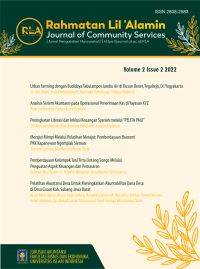Main Article Content
Abstract
The purpose of this Community Partnership Program (PKM) is to provide understanding and expertise to GP Ansor Trasan Village in Islamic financial literacy and inclusion through the use of information technology (PELITA PAGI) so that GP Ansor in Trasan Village can improve family financial capabilities. This can be directly practiced by teaching investment in sharia. Ansor youth who take part in the community as helpers, fighters, and even pioneers in broadcasting, enforcing, and fortifying Islamic teachings must also be able to adapt to the growing development of technology, including in financial management. This service is carried out by providing investment understanding and training to Ansor youth in Islamic financial literacy and inclusion. This is also done by utilizing increasingly advanced technology in the form of securities applications (AJA**), so that Ansor youth can improve the financial capabilities of families and groups. The results of the service activities, it can be concluded that the service participants who came from GP Ansor Trasan Village gained knowledge and skills about Islamic financial literacy and inclusion. In addition, participants can start practicing sharia investment through the use of information technology in the AJAIB application.
Keywords
Article Details
Copyright (c) 2022 Siti Afidatul Khotijah, Diah Agustina Prihastiwi, Ari Nurul Fatimah

This work is licensed under a Creative Commons Attribution-ShareAlike 4.0 International License.
Authors who publish with this journal agree to the following terms:
- Authors retain copyright and grant the journal right of first publication with the work simultaneously licensed under a Creative Commons Attribution-ShareAlike 4.0 International License that allows others to share the work with an acknowledgement of the work's authorship and initial publication in this journal.
- Authors are able to enter into separate, additional contractual arrangements for the non-exclusive distribution of the journal's published version of the work (e.g., post it to an institutional repository or publish it in a book), with an acknowledgement of its initial publication in this journal.
- Authors are permitted and encouraged to post their work online (e.g., in institutional repositories or on their website) prior to and during the submission process, as it can lead to productive exchanges, as well as earlier and greater citation of published work (See The Effect of Open Access).
Economic Journal of Emerging Markets by Center for Economic Studies, Universitas Islam Indonesia is licensed under a Creative Commons Attribution-ShareAlike 4.0 International License.
References
- Anwar, M., Purwanto, E., Suwaidi, R. A., & Anienda, M. (2017). Keuangan Inklusif dan Literasi Keuangan: Studi Pada Sentra industri kecil di Jawa Timur. Jurnal Riset Ekonomi dan Manajemen, 17(2), 273–282.
- Dewi, R. S., & Munawaroh. (2019). IBM Literasi Keuangan Syariah Bagi Masyarakat Di Desa Ara Payung Kecamatan Pantai Cermin. Prosiding Seminar Nasional Hasil Pengabdian, 535–538. https://www.e-prosiding.umnaw.ac.id/index.php/pengabdian/article/view/170
- Fahlefi, R. (2018). Inklusi Keuangan Syariah Melalui Inovasi Fintech di Sektor Filantropi. Batusangkar International Conference III, 205–212.
- Febriaty, H., Rahayu, S. E., & Nasution, E. Y. (2020). Pengaruh inklusi keuangan pada era digital ekonomi terhadap pertumbuhan ekonomi indonesia. Seminar of Social Sciences Engineering & Humaniora, XI(September 2018), 223–234.
- Ansor Gempol. 2021. “GP Ansor Gempol Luncurkan Koin Ansor”, https://www.ansorgempol.or.id/2021/03/gp-ansor-gempol-luncurkan-koin-ansor.html, diakses pada 30 November 2021.
- Nurfalah, I., & Rusydiana, A. S. (2019). Digitalisasi Keuangan Syariah Menuju Keuangan Inklusif: Kerangka Maqashid Syariah. Ekspansi: Jurnal Ekonomi, Keuangan, Perbankan Dan Akuntansi, 11(1), 55. https://doi.org/10.35313/ekspansi.v11i1.1205
- World Bank. (2014). Financial Inclusion. Global Financial Development Report: Washington D.C.
References
Anwar, M., Purwanto, E., Suwaidi, R. A., & Anienda, M. (2017). Keuangan Inklusif dan Literasi Keuangan: Studi Pada Sentra industri kecil di Jawa Timur. Jurnal Riset Ekonomi dan Manajemen, 17(2), 273–282.
Dewi, R. S., & Munawaroh. (2019). IBM Literasi Keuangan Syariah Bagi Masyarakat Di Desa Ara Payung Kecamatan Pantai Cermin. Prosiding Seminar Nasional Hasil Pengabdian, 535–538. https://www.e-prosiding.umnaw.ac.id/index.php/pengabdian/article/view/170
Fahlefi, R. (2018). Inklusi Keuangan Syariah Melalui Inovasi Fintech di Sektor Filantropi. Batusangkar International Conference III, 205–212.
Febriaty, H., Rahayu, S. E., & Nasution, E. Y. (2020). Pengaruh inklusi keuangan pada era digital ekonomi terhadap pertumbuhan ekonomi indonesia. Seminar of Social Sciences Engineering & Humaniora, XI(September 2018), 223–234.
Ansor Gempol. 2021. “GP Ansor Gempol Luncurkan Koin Ansor”, https://www.ansorgempol.or.id/2021/03/gp-ansor-gempol-luncurkan-koin-ansor.html, diakses pada 30 November 2021.
Nurfalah, I., & Rusydiana, A. S. (2019). Digitalisasi Keuangan Syariah Menuju Keuangan Inklusif: Kerangka Maqashid Syariah. Ekspansi: Jurnal Ekonomi, Keuangan, Perbankan Dan Akuntansi, 11(1), 55. https://doi.org/10.35313/ekspansi.v11i1.1205
World Bank. (2014). Financial Inclusion. Global Financial Development Report: Washington D.C.

